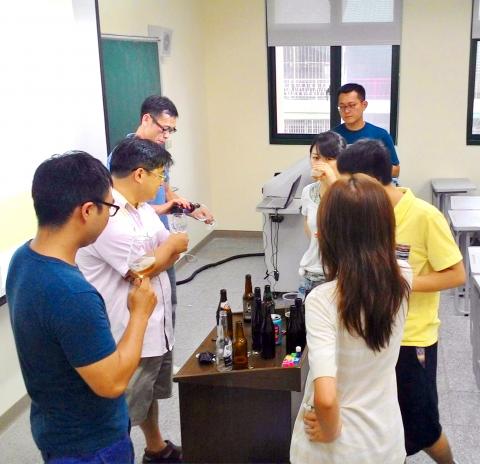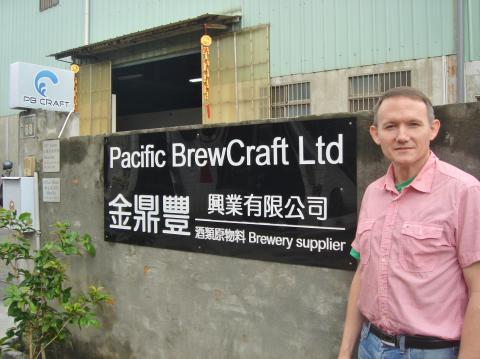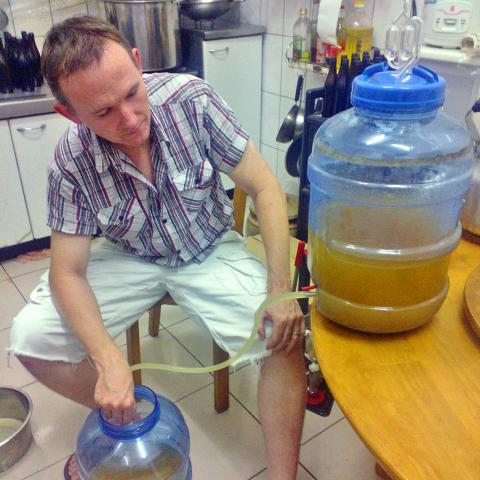Before he was a commercial brewery supplier in Taichung, Michael Forncrook worked as a software engineer in California’s Silicon Valley where he also started homebrewing as a hobby.
“Beer was my distraction from the stress of the tech world,” Forncrook tells me when I meet with him and his business partner, Jessica Huang (黃湘淇), at a cafe in Taipei.
When Forncrook and Huang, who worked in the tech industry in Hsinchu, launched Pacific Brew Craft (金鼎豐) in 2012, they were responding to a growing market. It was during this time that the Facebook group HomeBrew Maniacs (自釀啤酒狂熱份子俱樂部) was formed. A few years later, new craft breweries such as Hardcore Brewery, 23 Brewing and Taiwan Head Brewers were popping up all over the country, with many of these brewers getting their start learning how to homebrew via the Facebook group.

Photo courtesy of Pacific Brew Craft
Currently, Forncrook and Huang import wheat, barley, hops and other ingredients from Europe and the US and distribute to both homebrewers and commercial breweries (while Taiwan does grow wheat and barley, it’s not enough to sustain the industry).
In addition, they also distribute homebrewing equipment and teach homebrewing classes at two universities in Taichung, the National Taichung University of Science and Technology and Hungkuang University.
NICHE MARKET

Photo courtesy of Pacific Brew Craft
Beer production was something that the duo saw as a growing industry in both Taiwan and Asia (Pacific Brew Craft also has offices in Hong Kong and Xiamen).
Forncrook attributes this to a number of factors. Most importantly, young people in their late 20s and early 30s have more disposable income to spend on so-called “niche” markets like craft beer.
At the same time, foreign beers have been pushing their products into Asia over the last couple of years. Bars like Beer & Cheese and Chuoyinshi (啜飲室) have an extensive selection of North American craft beers on tap. Meanwhile, homebrewers from Taiwan are seeing other local brewers taking the plunge and opening breweries, thus providing more impetus for them to start their own businesses.

Photo courtesy of Pacific Brew Craft
Of course, the market is still nowhere as big as it is in the US, Europe or Japan, where there is more of an ingrained drinking culture.
But as Forncrook says, the market is currently “fashionable.”
Huang is less optimistic. She believes there is a deep-rooted reason why craft beer has yet to infiltrate the market. While younger people, especially those who have traveled overseas, are generally more open to a tipple, Huang says older generations “tend to view drinking alcohol as a bad thing.”
Huang ascribes this teetotaler culture to Buddhist influence. Europe, she says, could not be more different. Whereas beer was produced as early as the 11th century by Benedictines in Bavarian churches, Buddhism for the most part prohibits alcohol consumption.
LEGAL RESTRICTIONS
In fact, it’s not a stretch to say that craft beer is still part of a counter-culture movement. Though it’s illegal for homebrewers to sell beer without a license (as it is in other countries), there are government regulations that restrict alcohol brewing.
Put simply, it is technically illegal to pay to learn how to make alcohol — though this law is neither strictly enforced nor monitored. Contrast this with the US, where colleges not only offer homebrewing classes but also degree programs in brewing.
So far, Forncrook and Huang have not encountered any trouble with the homebrewing classes that they help run at the two Taichung universities, which are open to the public and not part of the schools’ curriculum.
They have asked the Taichung City Government to lobby the central government to change the law, stressing that the students are not producing alcohol to sell. Their efforts have been to no avail.
While the purpose of the regulation is to protect local businesses, Forncrook believes it ends up having the opposite effect.
Although it’s possible to purchase homebrewing equipment and teach yourself how to brew beer through online tutorials, due to the regulation, there aren’t many options for aspiring brewers who prefer to hone their skills in a classroom setting.
“In order to study how to become a brewer, you often have to leave Taiwan,” says Forncrook. “It’s anti-economy.
Both he and Huang hope that as the craft beer scene continues to grow, the law will eventually change to reflect this reality, though this is something that might take a little while.
“It’s not just an anti-alcohol culture, but it’s written in law, too,” Huang says.
Warning: Excessive consumption of alcohol can damage your health.
Taipei is a city that has positioned itself as being cheap and fast, but the revolution for craft drinks is taking wind and alcohol aficionados are thirsty for more. Drinking Taipei is a monthly column devoted to spotlighting chic, conceptual bars that aren’t your typical watering hole.

Taiwan has next to no political engagement in Myanmar, either with the ruling military junta nor the dozens of armed groups who’ve in the last five years taken over around two-thirds of the nation’s territory in a sprawling, patchwork civil war. But early last month, the leader of one relatively minor Burmese revolutionary faction, General Nerdah Bomya, who is also an alleged war criminal, made a low key visit to Taipei, where he met with a member of President William Lai’s (賴清德) staff, a retired Taiwanese military official and several academics. “I feel like Taiwan is a good example of

March 2 to March 8 Gunfire rang out along the shore of the frontline island of Lieyu (烈嶼) on a foggy afternoon on March 7, 1987. By the time it was over, about 20 unarmed Vietnamese refugees — men, women, elderly and children — were dead. They were hastily buried, followed by decades of silence. Months later, opposition politicians and journalists tried to uncover what had happened, but conflicting accounts only deepened the confusion. One version suggested that government troops had mistakenly killed their own operatives attempting to return home from Vietnam. The military maintained that the

Before the last section of the round-the-island railway was electrified, one old blue train still chugged back and forth between Pingtung County’s Fangliao (枋寮) and Taitung (台東) stations once a day. It was so slow, was so hot (it had no air conditioning) and covered such a short distance, that the low fare still failed to attract many riders. This relic of the past was finally retired when the South Link Line was fully electrified on Dec. 23, 2020. A wave of nostalgia surrounded the termination of the Ordinary Train service, as these train carriages had been in use for decades

Lori Sepich smoked for years and sometimes skipped taking her blood pressure medicine. But she never thought she’d have a heart attack. The possibility “just wasn’t registering with me,” said the 64-year-old from Memphis, Tennessee, who suffered two of them 13 years apart. She’s far from alone. More than 60 million women in the US live with cardiovascular disease, which includes heart disease as well as stroke, heart failure and atrial fibrillation. And despite the myth that heart attacks mostly strike men, women are vulnerable too. Overall in the US, 1 in 5 women dies of cardiovascular disease each year, 37,000 of them